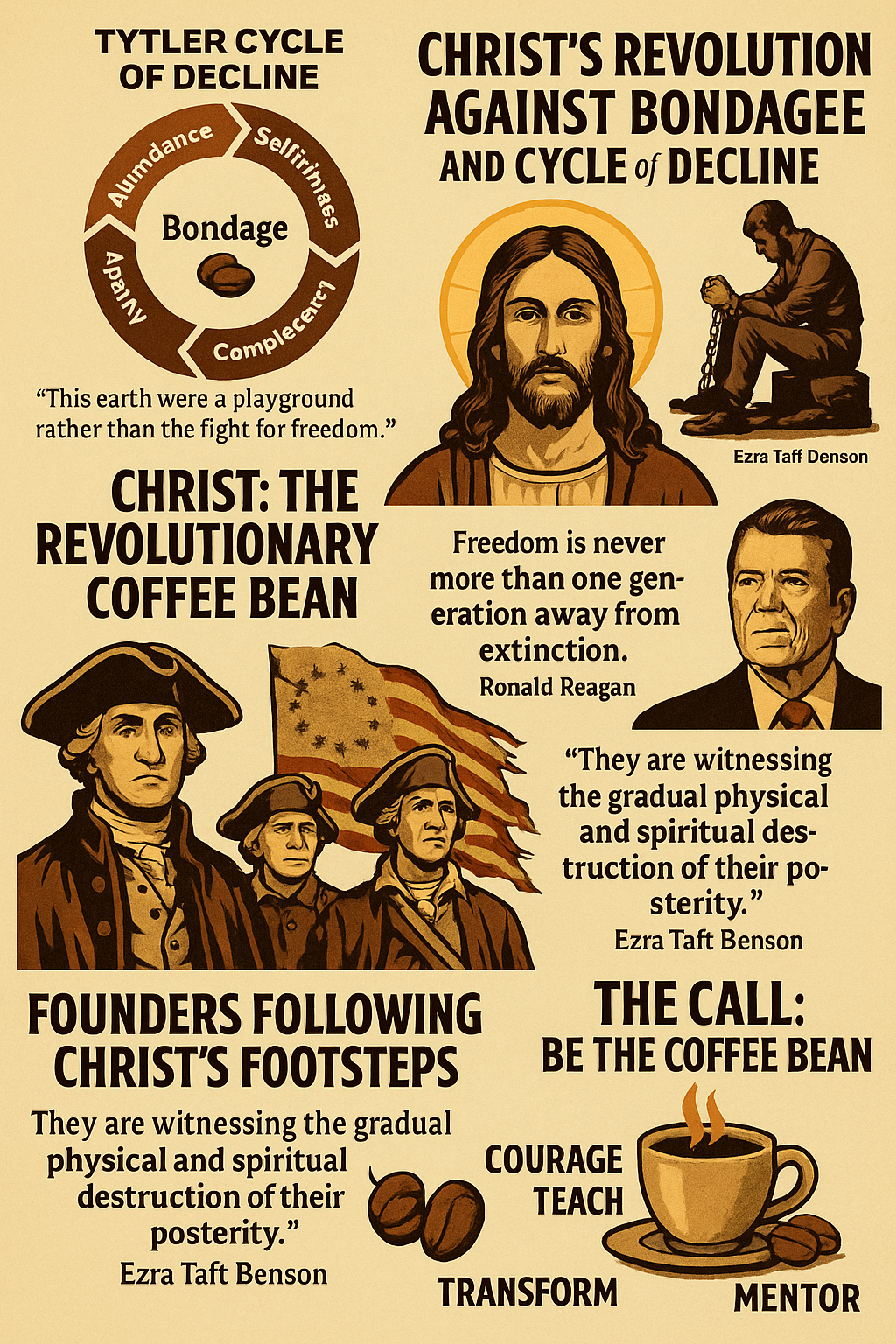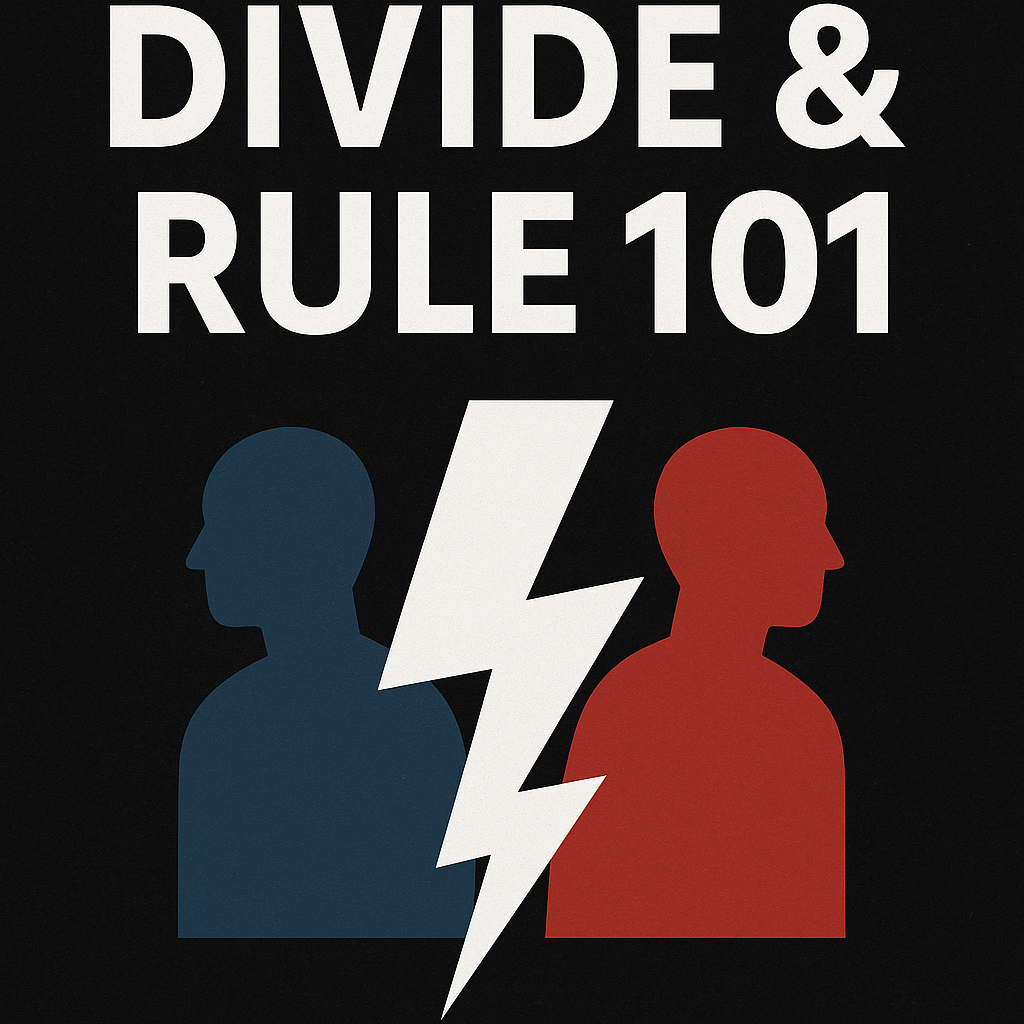In every age of abundance, history whispers a warning. Societies, like boiling pots, transform people as surely as heat transforms an egg, a potato—or a coffee bean. While some grow hardened and others fall apart, a rare few change the water itself. Jesus Christ was one of them. So were the Founding Fathers of the United States. Today, we are asked the same question: What will we become in the heat of this moment?
The Tytler Cycle and the Descent into Bondage
Scottish philosopher Alexander Tytler observed that free societies follow a predictable cycle:
- Abundance
- Selfishness
- Complacency
- Apathy
- Dependence
- Bondage
This cycle is more than political—it is deeply spiritual. The bondage at the end is not only external, but internal: psychological, moral, emotional, and even spiritual captivity. And just as Christ entered a Roman-Jewish society deep in complacency, apathy, and religious hypocrisy, He became the radical force—the coffee bean—that transformed the water rather than allowing Himself to be altered by it.
The State of the World: Where Was Society in the Cycle?
Abundance and Selfishness
- Under Roman rule, Jerusalem was a cultural and economic center with both lavish elite lifestyles and widespread poverty.
- Religious leaders (Pharisees and Sadducees) often exploited power for prestige, wealth, and influence, ignoring mercy and justice.
- The Temple economy was corrupt, charging exploitative fees and turning worship into profit.
Complacency and Apathy
- Many Jews, weary of Roman oppression, were passive and resigned, hoping for a political messiah but unwilling to challenge corruption.
- The average citizen followed rote religious traditions without understanding their spiritual roots.
- Conformity to the system—religious or Roman—was safer than resistance.
Dependence and Bondage
- Politically, they were under Rome’s thumb.
- Spiritually, they were bound by legalism, hypocrisy, and fear of excommunication.
- Emotionally and psychologically, many were crushed under shame, sin, and silence, unsure how to escape.
Christ: The Revolutionary Coffee Bean
Jesus did not fit neatly into the religious, cultural, or governmental expectations of His time. He called out the spiritual decay of religious leaders, challenged the complacency of His people, and invited the dependent and despairing into a Kingdom not of this world. His teachings were not merely about comfort or rules—they were an invitation into the learning and growth zone, out of the comfort and fear zones that had gripped society.
“It’s so unfortunate that so many members of the church are so preoccupied with the daily affairs and pleasures of this temporary world that many of us go through mortality as if this earth were a playground rather than the battleground it really is.”
—Steven A. Cramer, Putting on the Armor of God
To follow Christ’s example is to engage the battle. To live the gospel is to embrace both spiritual transformation and civic courage.
Jesus as the Radical Disruptor
In this cultural stew of fear, control, and conformity, Jesus arrived not to blend in, but to transform.
Spiritual Faith → Courage
Jesus rekindled Stage 1 of the Tytler Cycle, calling people to spiritual rebirth. His words were not soft affirmations but bold calls:
- “Repent, for the kingdom of heaven is at hand.” (Matthew 4:17)
- “You shall know the truth, and the truth shall set you free.” (John 8:32)
He taught not blind obedience, but courageous inner transformation—a return to authentic faith, justice, mercy, and truth.
Liberty from Inner Bondage
Jesus offered freedom, but not the political kind the zealots expected. His revolution was spiritual, moral, and psychological:
- Freedom from sin (John 8:34–36).
- Freedom from fear (Matthew 10:28).
- Freedom from religious control (Matthew 23, the seven woes against the Pharisees).
He liberated lepers, prostitutes, tax collectors, the demon-possessed, and the shamed—those considered irredeemable by society.
Mentorship in the Growth Zone
Jesus didn’t just teach. He mentored. He pulled disciples out of their comfort and fear zones:
- He called Peter from his nets and Matthew from his tax booth.
- He challenged their assumptions: “You have heard it said… but I say…”
- He taught them to walk in faith, feed the hungry, confront religious hypocrisy, and stand alone in truth.
In doing so, he activated courage, spiritual autonomy, and moral maturity—the opposite of dependence.
Why Society, Church, and State Rejected Him
He Threatened Their Control
The religious elite had built a power structure that thrived on fear, legalism, and economic manipulation. Jesus flipped their tables—literally and metaphorically.
He Exposed Their Bondage
Jesus called out not just the sins of the people, but of the rulers. He pulled back the curtain on their moral rot, like a light that made everyone uncomfortable:
- “Woe to you, teachers of the law… you clean the outside… but inside you are full of greed and self-indulgence.” (Matthew 23:25)
He Called for Real Change
Society wanted reform without repentance. Jesus offered the opposite:
- “Deny yourself, take up your cross, and follow me.” (Matthew 16:24)
This was not political posturing. It was a full-blown paradigm shift—a call to die to self and live a radically different kind of life.
The Coffee Bean’s Legacy: Transformation Through Resistance
Though crucified by the very powers he challenged, Jesus’ message outlived them. Why?
Because like a coffee bean in boiling water, he:
- Changed the atmosphere around him without becoming bitter (like the egg) or broken (like the potato).
- Withstood persecution while maintaining clarity, compassion, and conviction.
- Infused history with a new standard of truth, mercy, and nonconformity.
And he left behind disciples—other coffee beans—who continued the work.
The Founders: Following Christ’s Footsteps
America’s Founding Fathers, while flawed, reflected this radical spirit. Many were deeply inspired by biblical principles and the conviction that liberty—both internal and external—was a God-given right worth defending. Like Christ, they stood against the comfort of the status quo. They risked their lives to push an empire out of complacency and into revolution.
“There were souls who wished afterward that they had stood and fought with Washington and the founding fathers but they waited too long—they passed up eternal glory.”
—Ezra Taft Benson
Their understanding of liberty was not confined to policy. It was principle-centered. They believed tyranny—spiritual or political—was a denial of divine inheritance.
Ezra Taft Benson and the Gospel of Freedom
No modern church leader articulated this connection between faith and freedom more powerfully than Ezra Taft Benson. For him, the gospel was not a private retreat but a call to public courage.
“There is no need to get involved in the fight for Freedom—all you need to do is live the gospel… Of course, this is a contradiction, because we cannot fully live the gospel and not be involved in the fight for freedom.”
—Ezra Taft Benson
He warned of the generational cost of complacency:
“Because some parents have refused to become informed and then stand up and inform their children, they are witnessing the gradual physical and spiritual destruction of their posterity.”
—Ezra Taft Benson
And he called the war in heaven not a past event, but a present struggle:
“As important as are all other principles of the gospel, it was the freedom issue that determined whether you received a body. To have been on the wrong side of the freedom issue during the war in heaven meant eternal damnation. How then can Latter-day Saints expect to be on the wrong side in this life and escape the eternal consequences? The war in heaven is raging on earth today.”
—Ezra Taft Benson
Reagan’s Warning and the Responsibility of Every Generation
Ronald Reagan echoed the burden and the hope:
“Freedom is never more than one generation away from extinction. We didn’t pass it to our children in the bloodstream. It must be fought for, protected, and handed on for them to do the same, or one day we will spend our sunset years telling our children and our children’s children what it was once like in the United States where men were free.”
—Ronald Reagan
Whether in Christ’s Jerusalem or Jefferson’s America, liberty always walks a narrow road. The comfort-seeking crowd will crucify the coffee bean. The fearful will cling to their chains. But a few will rise to remain, teach, mentor, and transform.
The Choice Today: What Kind of Person Will You Be?
You too live in a system slipping toward bondage—economic, moral, and spiritual. The question is:
Will you conform like the egg?
Will you collapse like the potato?
Or will you transform the water like Christ?
This is the test of every age. And every age needs courageous souls who choose God over comfort, character over compliance, and truth over tyranny.
The Call: Be the Coffee Bean
In a society addicted to ease and dominated by apathy, God’s invitation is not escape—but engagement. Do not harden like the egg. Do not dissolve like the potato. Transform the world like the coffee bean. Infuse your family, community, and country with spiritual courage, moral clarity, and a liberty that is as eternal as it is urgent.
To live the gospel is to stand where Christ stood—between empire and the oppressed, between comfort and conviction, between Tytler’s decline and divine deliverance.
And to those who still ask what one person can do?
Christ’s life is your answer.
“In the world you will have tribulation. But take heart; I have overcome the world.” — John 16:33






